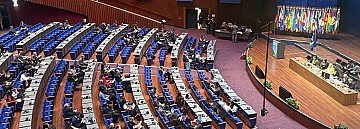- The International Federation for Human Rights (FIDH) together with member organisations from around the world actively participated in the 23rd session of the Assembly of States Parties (ASP23) to the Rome Statute of the International Criminal Court (ICC), held in The Hague from 2-7 December 2024.
- FIDH co-hosted eight side events in the margins of ASP23, and presented three key recommendations to ICC States Parties, aiming to protect and strengthen the Court’s operations, uphold the integrity of the Rome Statute system, and prioritise victim-centred justice at the ICC.
Paris, The Hague, 6 December 2024. This year, the Assembly of States Parties (ASP) took place amidst an unprecedented backdrop of alarming threats and attacks targeting the ICC. In the context of growing political pressure and intimidation faced by the ICC and its officials, FIDH and its member organisations advocated for States Parties to mobilise and stand up in defence of the Court’s independence and the Rome Statute system as a whole.
Oleksandra Matviichuk, Head of the FIDH delegation, FIDH Vice President, and Head of the Center for Civil Liberties (Ukraine), stressed: "This Assembly holds the power to safeguard the ICC’s future" and that "the decisions made this week will determine the Court’s ability to deliver timely and meaningful justice to the world’s most vulnerable victims."
ICC President Judge Tomoko Akane in her powerful opening remarks stressed the extraordinary situation and the real danger the Court is currently facing. Addressing "the existential threat" posed by looming United States sanctions, the ICC President warned that such measures "would rapidly undermine the Court’s operations in all situations and cases and jeopardise its very existence", emphasising that the "fall of the Court would imply the fall of the rule of law in the international community and a final defeat of the fight against impunity".
Danya Chaikel, FIDH Representative to the ICC addressed these critical challenges at the side event "Obstructing Justice and Promoting Impunity: Political Pressure and Intimidation of International Criminal Court Officials", co-hosted by FIDH and its Palestinian member organisations. She highlighted the urgent need for States Parties to take a firm stand in defending the Court against attacks and safeguard its crucial role in international criminal accountability. Chaikel underscored the gravity of these challenges, stating: "The ICC is facing unprecedented threats to its ability to function. The Court was not built or set up to function alone. It needs all the stakeholders, including civil society, to work together and expose the impact of these attacks on ICC proceedings and victims. States Parties must take a firm stand to defend the independence and very survival of the Court. More than ever, we must work together to safeguard the Rome Statute system."
Through active participation in discussions and side events, FIDH urged States Parties to uphold their commitment to victim-centred justice and called for robust accountability for all victims, regardless of nationality or race. In partnership with the recently reconvened Victims’ Rights Working Group, FIDH co-hosted the side event, "Victims’ Rome Statute Rights at the ICC: Rebuilding Trust & Advancing Justice". The event addressed the challenges victims face throughout ICC proceedings, offering concrete recommendations to prioritise their concerns and exploring strategies to rebuild trust in the Court. Speakers included Marc Dubuisson, Director of the Division of Judicial Services, ICC Registry, and representatives from Darfur Women Action Group, Bureau d’études et de réflexions pour le bien-être des Communautés (BERCO), Al Haq, Sawt, and Afghan Women for Equality, Empowerment and Development. The event aimed to support the development of ICC policies on victims, including contributing to the current review of the Court’s 2012 Victims’ Strategy.
During the side-event "Justice for Sudan’s Victims and Survivors: Mapping Accountability Pathways" co-organised by FIDH, key stakeholders, including Abdel Salam Sidahmed of the Sudanese Human Rights Monitor (SHRM), and representatives from the Darfur Network for Human Rights (DNHR) and the Strategic Initiative for Women in the Horn of Africa (SIHA), in addition to Oleksandra Matviichuk, addressed the ongoing mass atrocities in Sudan. The discussion highlighted the grave challenges facing victims, such as egregious gender-based violence, and the urgent need for international justice to address decades of impunity.
FIDH and the Coalition for the International Criminal Court (CICC) also jointly launched their report, "Civil Society and the ICC: Pathways to Collaborative and Genuine Engagement". The event featured a high level panel of speakers from civil society, including representatives from the Ukrainian Legal Action Group (ULAG), the Palestinian Centre for Human Rights (PCHR), and Ensaf organisation (Libya), as well as ICC Registrar Osvaldo Zavala Giler and ICC Deputy Prosecutor Mame Mandiaye Niang. The interactive discussion focused on the importance of fostering meaningful collaboration with civil society to ensure the ICC’s transparency, inclusivity, and overall effectiveness. CSOs put forward concrete recommendations to improve engagement, which were met with constructive and receptive responses.
During the ASP23 General Debate, Raji Sourani, Director of PCHR and former FIDH Vice-President, delivered a powerful address to ICC States Parties, emphasising the urgent need for accountability for crimes committed against the Palestinian people. Representing Palestinian civil society organisations—including PCHR, Al-Haq, Defense for Children Palestine, Al-Mezan Center for Human Rights, and Addameer Prisoner Support and Human Rights Association—Sourani declared: "Despite the dawn of justice arriving late, we will continue to work on holding Israeli leaders accountable for the crimes committed against our people. The accountability clock has started ticking".
Palestinian voices were united in calling on ICC States Parties to honour their legal obligations under the Rome Statute by enforcing the ICC arrest warrants issued against Israeli Prime Minister Benjamin Netanyahu and former Defense Minister Yoav Gallant should they enter their territories. Sourani’s address underscored not only the critical role of international cooperation in ensuring justice but also the unshakable resolve of Palestinian civil society to stand together against impunity.


